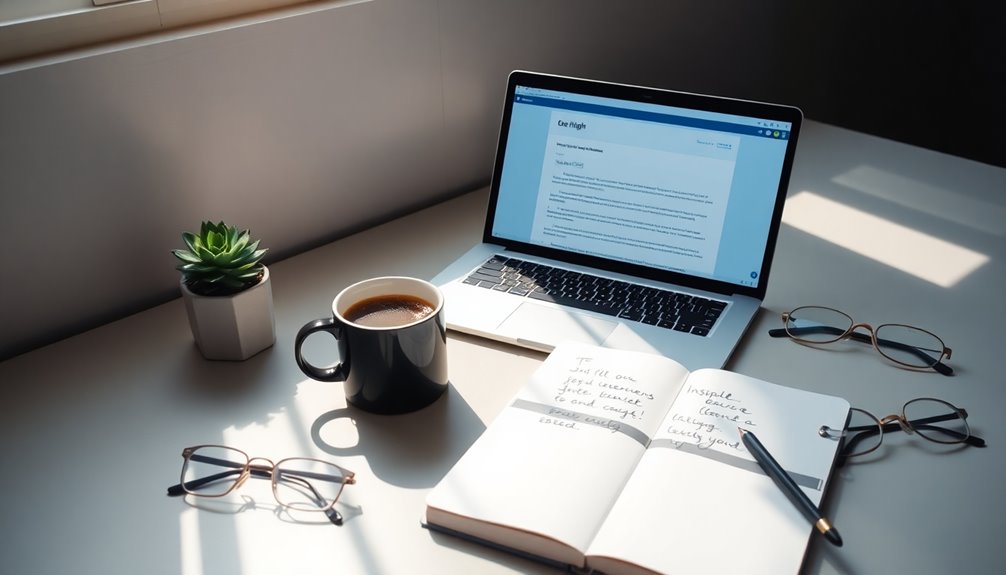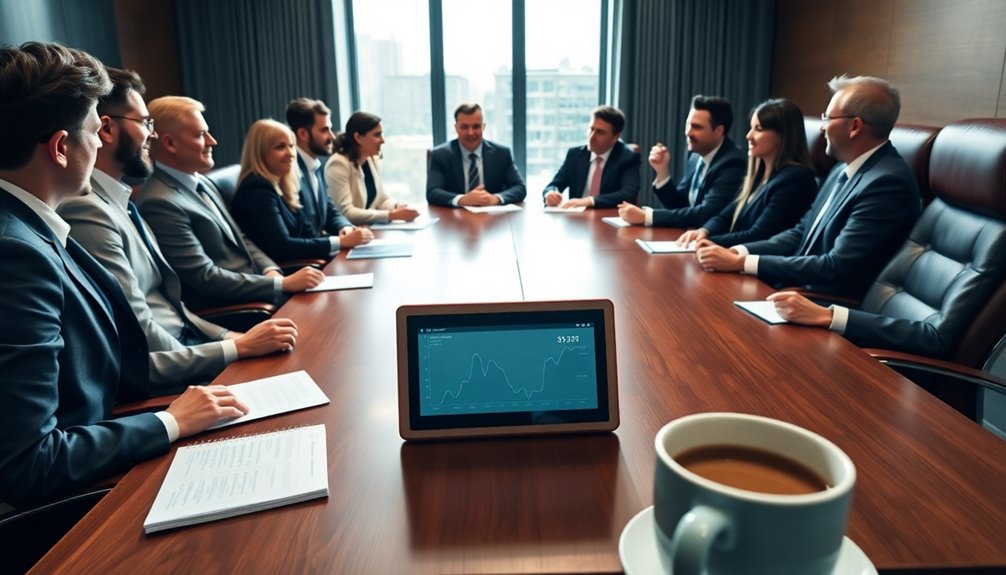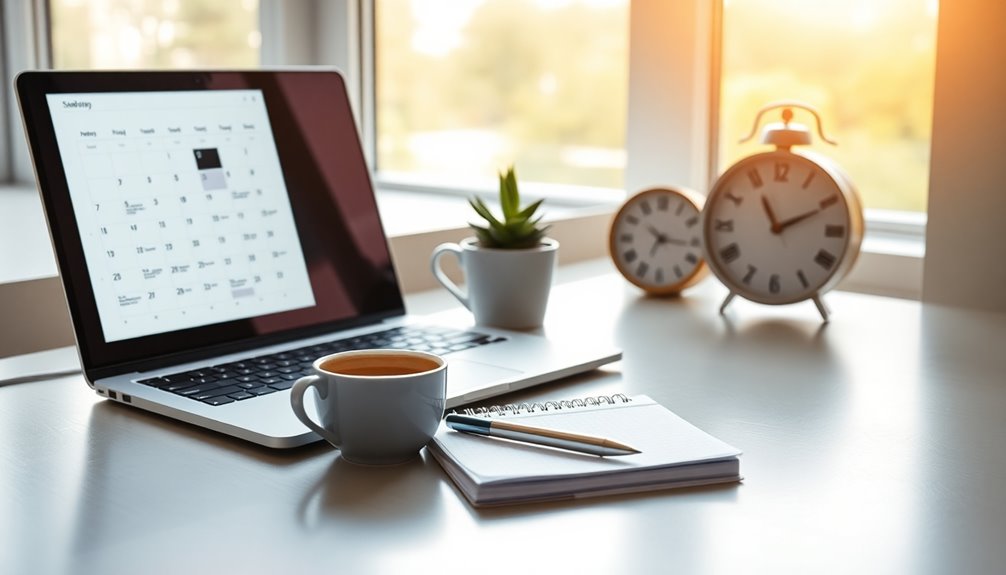When following up on a job interview, start with a thank-you note within 24 hours. Personalize it by referencing specific points discussed and reiterating your skills. Ask about the hiring timeline during the interview, then follow up 1-2 weeks later if you haven't heard back. Keep your tone professional and concise while expressing your continued interest. Respect the hiring manager's timeframe and avoid too many emails. Don't forget to stay connected, even if you're not selected, as preserving relationships can open doors later. There's plenty of actionable advice out there to help you succeed in this process.
Key Takeaways
- Express gratitude for the interview opportunity and mention specific discussions to personalize your message.
- Reiterate your interest in the position and highlight relevant skills or experiences that align with the job requirements.
- Offer additional information or insights that may assist the employer in their decision-making process.
- Keep the follow-up email concise, professional, and free from grammatical errors to maintain a positive impression.
- Respect the hiring timeline by waiting at least a week before following up if you haven't received a response.
Send a Thank You Note
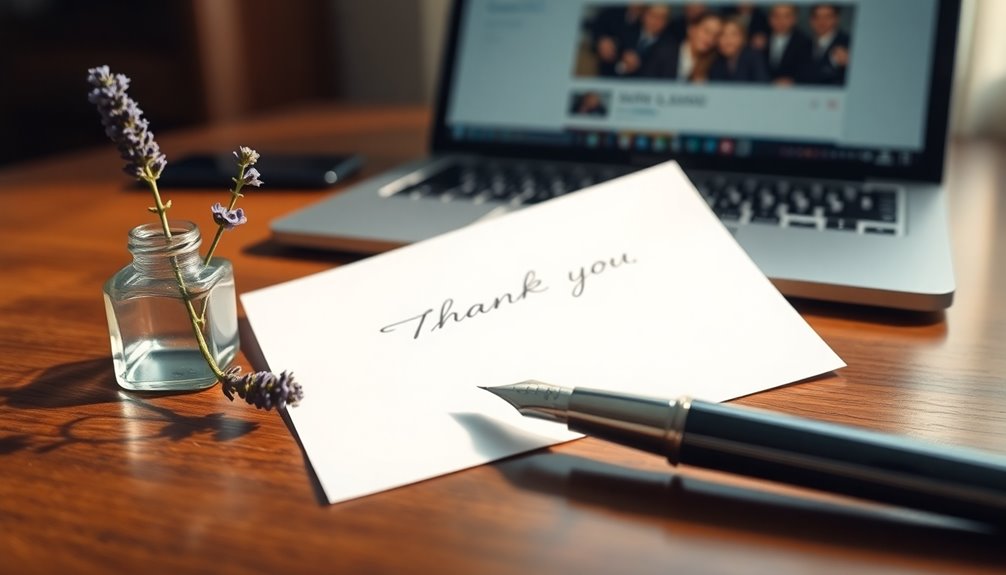
After your job interview, sending a thank-you note is essential. This follow-up message not only shows your appreciation for the employer's time but also reinforces your interest in the position. Aim to send a thank-you email within 24 hours of your interview to make a good impression.
When you craft your note, personalize it by mentioning specific points discussed during the interview. This indicates your attentiveness and can help you stand out among other candidates. Additionally, reiterate your relevant skills and experiences to strengthen your alignment with the job requirements. Research shows that about 70% of employers appreciate a follow-up message, so this thank-you note is a valuable opportunity to keep your candidacy top-of-mind in the hiring process.
Your thank-you note reflects your professionalism and gratitude, showcasing your communication skills and attention to detail. Remember, a thoughtful email follow-up can positively influence hiring decisions, especially if you highlight what you learned about the company and how you can contribute. By taking this simple yet impactful step, you enhance your chances of success in landing the job.
Inquire About Next Steps

Following up after sending your thank-you note, it's important to inquire about the next steps in the hiring process. During the interview, you should've asked, "What is the timeline for the hiring process?" This question provides clarity on when you can expect feedback. If you haven't received a response within the discussed timeframe, it's perfectly acceptable to send a polite follow-up email.
In your email, reiterate your interest in the position and express your gratitude for the opportunity to interview. Maintaining professionalism is vital, so use a friendly tone while inquiring about your application status. You can also offer to provide any additional information that may assist in their decision-making process.
Remember to exercise patience; allow at least a week before sending that follow-up email to avoid appearing desperate or overly enthusiastic. This approach not only shows your passion for the role but also demonstrates your respect for their timeline. By following these steps, you'll position yourself as a considerate and professional candidate, ready to take the next steps in the hiring process.
Maintain Ongoing Communication
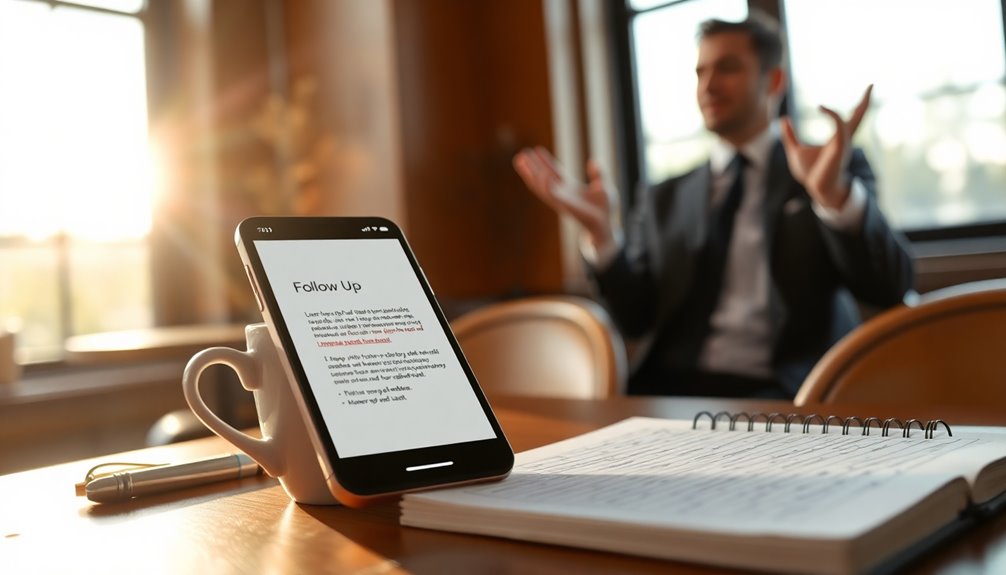
Maintaining ongoing communication after your job interview is essential for reinforcing your interest in the position. A thoughtful follow-up email or a thank you note sent within 24 hours not only expresses your gratitude but also serves as a valuable touchpoint for further communication. Research shows that 70% of employers appreciate follow-up messages, so don't hesitate to reach out.
Consider connecting with your interviewers on professional networks like LinkedIn. This can facilitate continued engagement and might open doors for future opportunities, even if you're not selected for the current position. Engaging with the company's content on social media also demonstrates your ongoing interest in the organization. It keeps you informed about future job openings and company news, which is vital in your job search.
If relevant, following up with additional insights or information related to your interview discussions can further illustrate your enthusiasm. This proactive approach not only keeps you on the employer's radar but also showcases your commitment and keenness for the role. By maintaining open lines of communication, you strengthen your candidacy and enhance your chances of making a lasting impression. Additionally, maintaining a high vibrational energy during your job search can attract positive outcomes and opportunities.
Exercise Patience
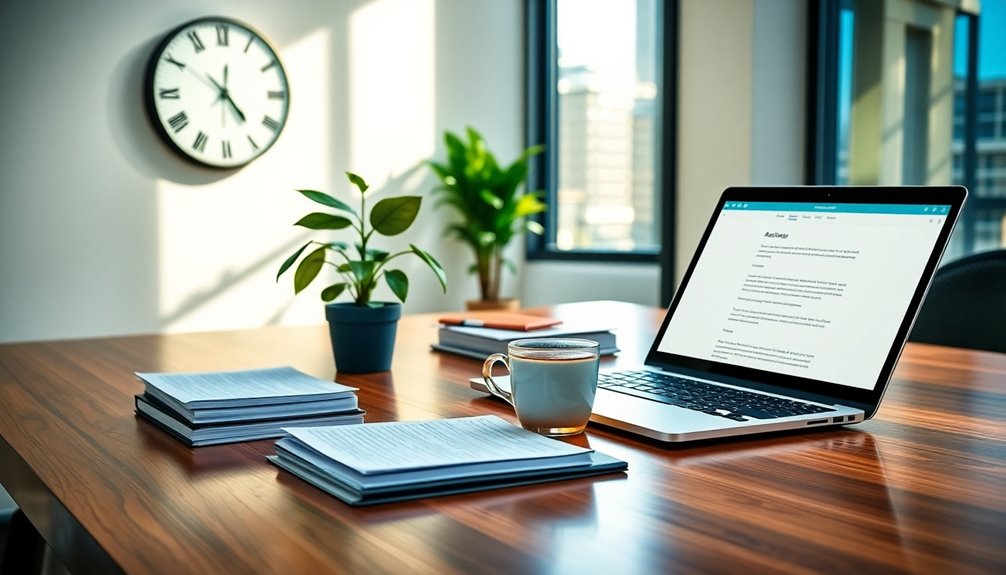
Patience is an essential virtue in the job search process, especially after an interview. Waiting for a hiring manager to get back to you can feel agonizing, but understanding the timeline can help ease your anxiety. Here are a few key points to reflect on during this waiting period:
- Hiring decisions often take one to two weeks.
- Too many follow-up emails can create a negative impression.
- Demonstrating patience reflects your professionalism.
- Continue exploring other opportunities to stay proactive.
Remember, it's vital to respect the employer's timeline. Excessive follow-ups can undermine your interest in the role and paint you as overly enthusiastic. Instead, focus on the long game. While you wait, keep the momentum of your job search going by applying for other positions. This proactive approach not only fills your time but also helps you avoid putting all your eggs in one basket.
Ultimately, exercising patience during this waiting period could leave a positive impression on the hiring manager, showing them that you understand the complexities of their decision-making process. Your calm demeanor can make you stand out as a candidate who's not just qualified, but also mature and professional.
Keep Professionalism in Mind
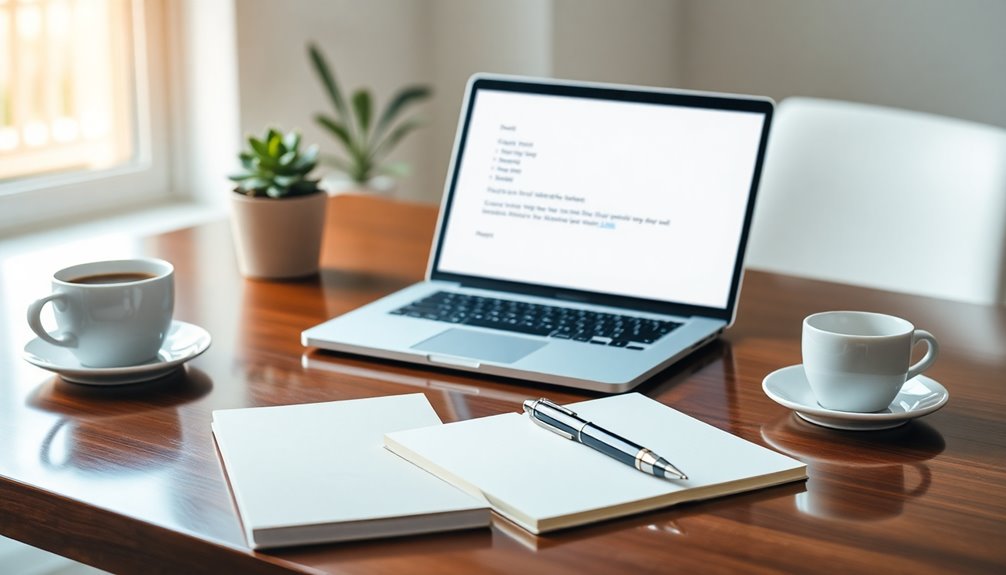
Professionalism plays an essential role in how you present yourself after a job interview. When you decide to follow up, guarantee that every piece of communication reflects your commitment to professionalism. Use email as your primary method for follow-ups; it's efficient and aligns with business norms. Keep your messages concise, expressing gratitude for the interview and reinforcing your interest in the job.
Here's a quick reference table to guide you:
| Aspect | What to Do | What to Avoid |
|---|---|---|
| Tone | Maintain a professional tone | Use informal language or slang |
| Content | Express gratitude and interest | Write lengthy or unfocused messages |
| Proofreading | Proofread for errors | Send messages with grammatical mistakes |
| Follow-up Frequency | Be patient with your follow-up | Overwhelm with excessive follow-ups |
Choose Appropriate Channels
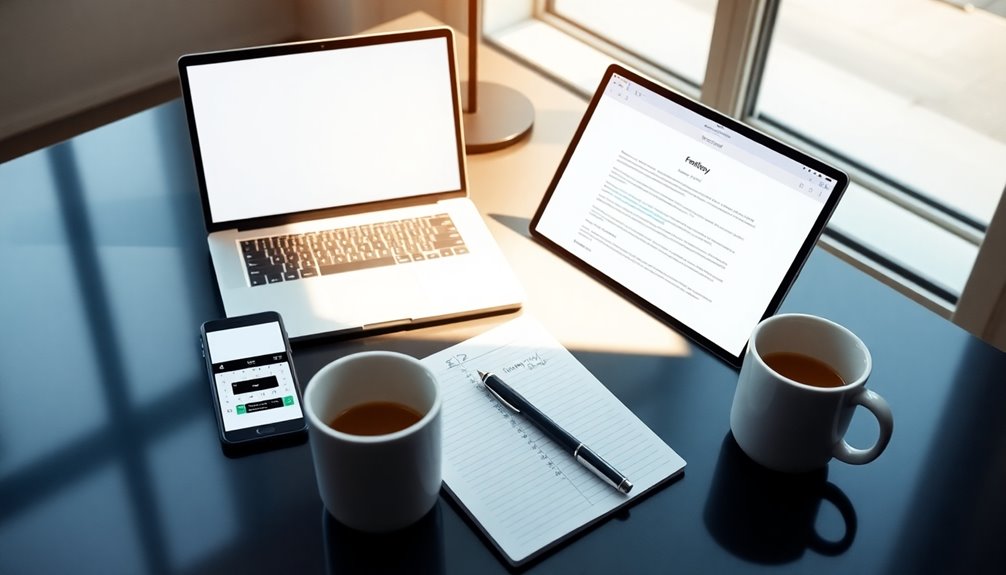
After you've established your professionalism in your follow-up communication, choosing the right channel is just as important. The channel you select can impact the effectiveness of your message and your chances of making a positive impression. Here are some options to take into account:
- Email: The most common and preferred method, it maintains professionalism and provides a record of correspondence.
- Handwritten Note: This adds a personal touch and can leave a lasting impression, but remember it takes more time to reach the recipient.
- Phone Call: If the interviewer indicated this preference, a respectful tone during the call can reinforce your commitment.
- LinkedIn: A great way to maintain rapport, just make sure your message is personalized.
Whichever channel you choose, ascertain your follow-up communication reflects your professionalism. Avoid informal language, and always convey a respectful tone. If you're unsure, leaning toward email is often a safe bet. Adhering to the interviewer's preferences shows that you respect their time and communication style, which can strengthen your rapport and increase your chances of success. Additionally, demonstrating strong communication skills during your follow-up can further highlight your suitability for roles in fields like Software Quality Assurance.
Be Persistently Respectful
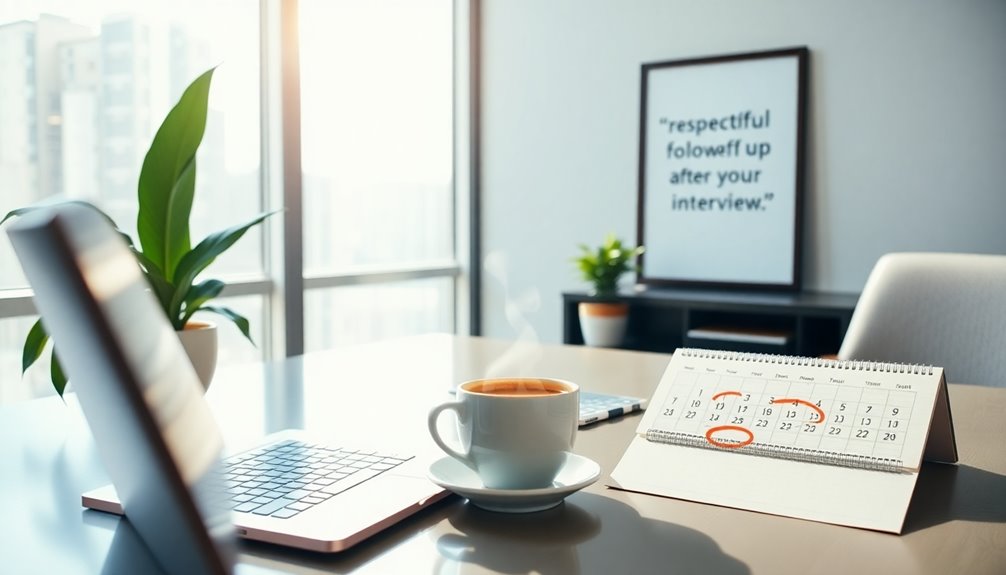
Your follow-up strategy should reflect a balance of enthusiasm and respect for the employer's process. Persistence is key in the hiring game, but you don't want to overwhelm your potential employer. After your job interview, consider sending a follow-up email about one to two weeks later if you haven't heard back. In this email, thank them for the opportunity and reiterate your interest in the position. This shows you're engaged without appearing pushy.
Be mindful of how often you reach out. Sending multiple emails or making repeated calls can create a negative impression, potentially annoying the hiring manager. Instead, focus on maintaining professionalism in each communication. This reinforces your personal brand and helps build good rapport, whether or not you land the position.
If you do follow up, offer to provide any additional information that may assist in their decision-making process. Including your contact information guarantees they can easily reach out to you. This respectful persistence reflects your genuine interest in the role while respecting their timeline and decision-making process.
Preserve Relationships

Even if you don't get the job, it's important to keep the lines of communication open with employers. Preserving relationships can lead to unexpected opportunities down the line. Here are some ways to maintain that connection:
- Send a thank-you email post-interview to express gratitude for the opportunity.
- Engage with interviewers on LinkedIn to foster a professional rapport.
- Follow up periodically to express your continued interest in future openings.
- Keep your communication professional to guarantee a positive impression.
- Maintaining digital literacy in communication can enhance your interactions with potential employers.
Frequently Asked Questions
How Do You Politely Follow up on a Job Interview?
To politely follow up on a job interview, send an email within 24-48 hours. Start by expressing your gratitude for the opportunity and reiterating your interest in the role. Keep the subject line clear, like "Thank You for the Opportunity." Reference specific points from your conversation to show engagement. Finally, ask about the next steps in the hiring process, maintaining a professional tone throughout, and make certain your message is error-free.
How Do You Politely Ask for Interview Results?
Good things come to those who wait, but you don't have to wait in silence. Politely ask for interview results by sending a follow-up email within 24 to 48 hours. Express gratitude for the opportunity, reference specific points from your conversation, and reiterate your interest in the position. A clear subject line and a concise message will keep it professional while gently inquiring about the hiring timeline. Remember, patience paired with professionalism is key.
How to Follow up on a Job Interview Without Sounding Desperate?
To follow up on a job interview without sounding desperate, express genuine gratitude for the interviewer's time and insights. Keep your message concise and professional, focusing on your continued interest in the role. Mention specific topics discussed to personalize your note and reinforce your fit. Politely inquire about the next steps, and allow one to two weeks before reaching out, showing patience and confidence in your candidacy.
What Are 5 Tips for a Successful Job Interview?
Think of your interview as a stage where you're the main act. To shine, research the company and role thoroughly to align your skills with their needs. Practice common questions and share specific examples to show your problem-solving abilities. Dress appropriately to make a strong first impression and prepare thoughtful questions that reflect your interest. After the interview, don't forget to follow up with a personalized thank-you email to reinforce your professionalism.
Conclusion
Following up after a job interview is like nurturing a delicate seed; with care and patience, it can blossom into a fruitful opportunity. By sending a thoughtful thank you note and staying engaged with the hiring team, you position yourself as a strong candidate. Remember to balance persistence with respect, and always maintain professionalism. With these tips in mind, you'll not only keep the communication lines open but also leave a lasting impression that could lead to success!
